#ai marketer
Explore tagged Tumblr posts
Text
Best AI Marketing Company in India
#ai#ai marketing#ai marketer#artificial intelligence marketing#ai marketing company#ai marketing agency
2 notes
·
View notes
Text
Digital Marketer in Vadodara
Digital Marketer in Vadodara.
Call +919819595495 for more details.
#digitalmarketer #digitalmarketing #marketing #socialmediamarketing #digitalmarketingtips #digitalmarketingagency #seo #socialmedia #digitalmarketingstrategy #marketingstrategy #marketingdigital #contentmarketing #digitalmarketingexpert #onlinemarketing #marketingtips #instagram #digitalmarketingservices #emailmarketing #marketingagency #business #digitalagency #entrepreneur #digital #marketingconsultant #marketingonline #affiliatemarketing #instagrammarketing #branding #socialmediastrategy #internetmarketing
https://digitalmarketer.pickmyurl.in/digital-marketer-in-vadodara
0 notes
Text





Imaginary pictures from an occult flea market.
9K notes
·
View notes
Text
Proud to be a blockhead
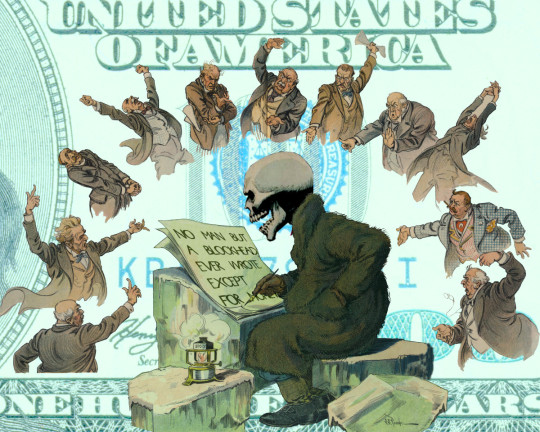
If you'd like an essay-formatted version of this post to read or share, here's a link to it on pluralistic.net, my surveillance-free, ad-free, tracker-free blog:
https://pluralistic.net/2024/12/21/blockheads-r-us/#vocational-awe

This is my last Pluralistic post of the year, and rather than round up my most successful posts of the year, I figured I'd write a little about why it's impossible for me to do that, and why that is by design, and what that says about the arts, monopolies, and creative labor markets.
I started Pluralistic nearly five years ago, and from the outset, I was adamant that I wouldn't measure my success through quantitative measures. The canonical version of Pluralistic – the one that lives at pluralistic.net – has no metrics, no analytics, no logs, and no tracking. I don't know who visits the site. I don't know how many people visit the site. I don't know which posts are most popular, and which ones are the least popular. I can't know any of that.
The other versions of Pluralistic are less ascetic, but only because there's no way for me to turn off some metrics on those channels. The Mailman service that delivers the (tracker-free) email version of Pluralistic necessarily has a system for telling me how many subscribers I have, but I have never looked at that number, and have no intention of doing so. I have turned off notifications when someone signs up for the list, or resigns from it.
The commercial, surveillance-heavy channels for Pluralistic – Tumblr, Twitter – have a lot of metrics, but again, I don't consult them. Medium and Mastodon have some metrics, and again, I just pretend they don't exist.
What do I pay attention to? The qualitative impacts of my writing. Comments. Replies. Emails. Other bloggers who discuss it, or discussions on Metafilter, Slashdot, Reddit and Hacker News. That stuff matters to me a lot because I write for two reasons, which are, in order: to work out my own thinking, and; to influence other peoples' thinking.
Writing is a cognitive prosthesis for me. Working things out on the page helps me work things out in my life. And, of course, working things out on the page helps me work more things out on the page. Writing begets writing:
https://pluralistic.net/2021/05/09/the-memex-method/
Honestly, that is sufficient. Not in the sense that writing, without being read, would make me happy or fulfilled. Being read and being part of a community and a conversation matters a lot to me. But the very act of writing is so important to me that even if no one read me, I would still write.
This is a thing that writers aren't supposed to admit. As I wrote on this blog's fourth anniversary, the most laughably false statement about writing ever uttered is Samuel Johnson's notorious "No man but a blockhead ever wrote but for money":
https://pluralistic.net/2024/02/20/fore/#synthesis
Making art is not an "economically rational" activity. Neither is attempting to persuade other people to your point of view. These activities are not merely intrinsically satisfying, they are also necessary, at least for many of us. The long, stupid fight about copyright that started in the Napster era has rarely acknowledged this, nor has it grappled with the implications of it. On the one hand, you have copyright maximalists who say totally absurd things like, "If you don't pay for art, no one will make art, and art will disappear." This is one of those radioactively false statements whose falsity is so glaring that it can be seen from orbit.
But on the other hand, you know who knows this fact very well? The corporations that pay creative workers. Movie studios, record labels, publishers, games studios: they all know that they are in possession of a workforce that has to make art, and will continue to do so, paycheck or not, until someone pokes their eyes out or breaks their fingers. People make art because it matters to them, and this trait makes workers terribly exploitable. As Fobazi Ettarh writes in her seminal paper on "vocational awe," workers who care about their jobs are at a huge disadvantage in labor markets. Teachers, librarians, nurses, and yes, artists, are all motivated by a sense of mission that often trumps their own self-interest and well-being and their bosses know it:
https://www.inthelibrarywiththeleadpipe.org/2018/vocational-awe/
One of the most important ideas in David Graeber's magisterial book Bullshit Jobs is that the ground state of labor is to do a job that you are proud of and that matters to you, but late-stage capitalist alienation has gotten so grotesque that some people will actually sneer at the idea that, say, teachers should be well compensated: "Why should you get a living wage – isn't the satisfaction of helping children payment enough?"
https://memex.craphound.com/2018/06/20/david-graebers-bullshit-jobs-why-does-the-economy-sustain-jobs-that-no-one-values/
These are the most salient facts of the copyright fight: creativity is a non-economic activity, and this makes creative workers extremely vulnerable to exploitation. People make art because they have to. As Marx was finishing Kapital, he was often stuck working from home, having pawned his trousers so he could keep writing. The fact that artists don't respond rationally to economic incentives doesn't mean they should starve to death. Art – like nursing, teaching and librarianship – is necessary for human thriving.
No, the implication of the economic irrationality of vocational awe is this: the only tool that can secure economic justice for workers who truly can't help but do their jobs is solidarity. Creative workers need to be in solidarity with one another, and with our audiences – and, often, with the other workers at the corporations who bring our work to market. We are all class allies locked in struggle with the owners of both the entertainment companies and the technology companies that sit between us and our audiences (this is the thesis of Rebecca Giblin's and my 2022 book Chokepoint Capitalism):
https://chokepointcapitalism.com/
The idea of artistic solidarity is an old and important one. Victor Hugo, creator of the first copyright treaty – the Berne Convention – wrote movingly about how the point of securing rights for creators wasn't to allow their biological children to exploit their work after their death, but rather, to ensure that the creative successors of artists could build on their forebears' accomplishments. Hugo – like any other artist who has a shred of honesty and has thought about the subject for more than ten seconds – knew that he was part of a creative community and tradition, one composed of readers and writers and critics and publishing workers, and that this was a community and a tradition worth fighting for and protecting.
One of the most important and memorable interviews Rebecca and I did for our book was with Liz Pelly, one of the sharpest critics of Spotify (our chapter about how Spotify steals from musicians is the only part of the audiobook available on Spotify itself – a "Spotify Exclusive"!):
https://open.spotify.com/show/7oLW9ANweI01CVbZUyH4Xg
Pelly has just published a major, important new book about Spotify's ripoffs, called Mood Machine:
https://www.simonandschuster.com/books/Mood-Machine/Liz-Pelly/9781668083505
A long article in Harper's unpacks one of the core mechanics at the heart of Spotify's systematic theft from creative workers: the use of "ghost artists," whose generic music is cheaper than real music, which is why Spotify crams it into their playlists:
https://harpers.org/archive/2025/01/the-ghosts-in-the-machine-liz-pelly-spotify-musicians/
The subject of Ghost Artists has long been shrouded in mystery and ardent – but highly selective – denials from Spotify itself. In her article – which features leaked internal chats from Spotify – Pelly gets to the heart of the matter. Ghost artists are musicians who are recruited by shadowy companies that offer flat fees for composing and performing inoffensive muzak that can fade into the background. This is wholesaled to Spotify, which crams it into wildly popular playlists of music that people put on while they're doing something else ("Deep Focus," "100% Lounge," "Bossa Nova Dinner," "Cocktail Jazz," "Deep Sleep," "Morning Stretch") and might therefore settle for an inferior product.
Spotify calls this "Perfect Fit Music" and it's the pink slime of music, an extruded, musiclike content that plugs a music-shaped hole in your life, without performing the communicative and aesthetic job that real music exists for.
After many dead-end leads with people involved in the musical pink slime industry, Pelly finally locates a musician who's willing to speak anonymously about his work (he asks for anonymity because he relies on the pittances he receives for making pink slime to survive). This jazz musician knows very little about where the music he's commissioned to produce ends up, which is by design. The musical pink slime industry, like all sleaze industries, is shrouded in the secrecy sought by bosses who know that they're running a racket they should be ashamed of.
The anonymous musician composes a stack of compositions on his couch, then goes into a studio for a series of one-take recordings. There's usually a rep from the PFC pink slime industry there, and the rep's feedback is always "play simpler." As the anonymous musician explains:
That’s definitely the thing: nothing that could be even remotely challenging or offensive, really. The goal, for sure, is to be as milquetoast as possible.
This source calls the arrangement "shameful." Another musician Pelly spoke to said "it felt unethical, like some kind of money-laundering scheme." The PFC companies say that these composers and performers are just making music, the way anyone might, and releasing it under pseudonyms in a way that "has been popular across mediums for decades." But Pelly's interview subjects told her that they don't consider their work to be art:
It feels like someone is giving you a prompt or a question, and you’re just answering it, whether it’s actually your conviction or not. Nobody I know would ever go into the studio and record music this way.
Artists who are recruited to make new pink slime are given reference links to existing pink slime and ordered to replicate it as closely as possible. The tracks produced this way that do the best are then fed to the next group of musicians to replicate, and so on. It's the musical equivalent of feeding slaughterhouse sweepings to the next generation of livestock, a version of the gag from Catch 22 where a patient in a body-cast has a catheter bag and an IV drip, and once a day a nurse comes and swaps them around.
Pelly reminds us that Spotify was supposed to be an answer to the painful question of the Napster era: how do we pay musicians for their labor? Spotify was sold as a way to bypass the "gatekeepers": the big three labels who own 70% of all recorded music, whose financial maltreatment of artists was seen as moral justification for file sharing ("Why buy the CD if the musician won't see any of the money from it?").
But the way that Spotify secured rights to all the popular music in the world was by handing over big equity stakes in its business to the Big Three labels, and giving them wildly preferential terms that made it impossible for independent musicians and labels to earn more than homeopathic fractions of a penny for each stream, even as Spotify became the one essential conduit for reaching an audience:
https://pluralistic.net/2021/03/16/wage-theft/#excessive-buyer-power
It turns out that getting fans to pay for music has no necessary connection to getting musicians paid. Vocational awe means that the fact that someone has induced a musician to make music doesn't mean that the musician is getting a fair share of what you pay for music. The same goes for every kind of art, and every field where vocational awe plays a role, from nursing to librarianship.
Chokepoint Capitalism tries very hard to grapple with this conundrum; the second half of the book is a series of detailed, shovel-ready policy prescriptions for labor, contract, and copyright reforms that will immediately and profoundly shift the share of income generated by creative labor from bosses to workers.
Which brings me back to this little publishing enterprise of mine, and the fact that I do it for free, and not only that, give it away under a Creative Commons Attribution license that allows you to share and republish it, for money, if you choose:
https://creativecommons.org/licenses/by/4.0/
I am lucky enough that I make a good living from my writing, but I'm also honest enough with myself to know just how much luck was involved with that fact, and insecure enough to live in a state of constant near-terror about what happens when my luck runs out. I came up in science fiction, and I vividly remember the writers I admired whose careers popped like soap-bubbles when Reagan deregulated the retail sector, precipitating a collapse in the grocery stores and pharmacies where "midlist" mass-market paperbacks were sold by the millions across the country:
https://pluralistic.net/2021/07/04/self-publishing/
These writers – the ones who are still alive – are living proof of the fact that you have to break our fingers to get us to stop writing. Some of them haven't had a mainstream publisher in decades, but they're still writing, and self-publishing, or publishing with small presses, and often they're doing the best work of their careers, and almost no one is seeing it, and they're still doing it.
Because we aren't engaged in economically rational activity. We're doing something essential – essential to us, first and foremost, and essential to the audiences and peers our work reaches and changes and challenges.
Pluralistic is, in part, a way for me too face the fear I wake up with every day, that some day, my luck will run out, as it has for nearly all the writers I've ever admired, and to reassure myself that the writing will go on doing what I need it to do for my psyche and my heart even if – when – my career regresses to the mean.
It's a way for me to reaffirm the solidaristic nature of artistic activity, the connection with other writers and other readers (because I am, of course, an avid, constant reader). Commercial fortunes change. Monopolies lay waste to whole sectors and swallow up the livelihoods of people who believe in what they do like a whale straining tons of plankton through its baleen. But solidarity endures. Solidarietatis longa, vita brevis.
Happy New Year folks. See you in 2025.
#pluralistic#writing#vocational awe#fobazi ettarh#liz pelly#spotify#class war#solidarity#ai#economics#homo economicus#labor markets#arts#starving artists#blogging#art
367 notes
·
View notes
Text
I rarely post personal stuff on here but irl I'm a writer whose work covers tech and AI quite a bit and with the WGA strike ongoing, I really want to stress that the reason Hollywood execs and higher-ups think they can just replace writers with chatgpt or have someone come and edit AI generated text is because they already think writing is that easy.
these people look at their shows, movies, etc as marketable (re, profitable) content so all they are watching for is "okay this show performed badly" and "this movie performed well" and I can promise you in a boardroom the quality, the time and effort that went into the actual writing is NEVER discussed as a contributing factor when it comes to the difference between those two things.
That's also the reason tools like chatgpt seem like magic to these people, because they've devalued the act of creation and everything that goes into making something that resonates with its audience, so naturally something that can scrape the entire digital world and spit something out that falls in line with what you asked seems like a wizard's spell, because they ALREADY think of writing as an afterthought, something where they just go "I need a show that appeals to the 16-24 age range" and writers can just fill in the blanks and they won't have to PAY PEOPLE for that.
There's a vast difference between art and content, and if you want to see more of the former, you should be furious they're trying to replace writers with what is essentially a programmable template generator. Pay your writers.
#wga#wga strike#ai is a great tool if you want to make a mass marketable thing that will offend the least amount of people and say nothing of interest#but if you want to use it to make an actual story people are going to actually care about...welp#pay your goddamn writers
5K notes
·
View notes
Text
Techbro marketing's conflation of generative language models with the term "artifical intelligence" to the point that many laypersons now think that's what AI is definitely sucks for, like, literally everybody who's working in genuine AI research, but I have to grant the way it's gotten tangled up with other historically inappropriate uses of the term "artificial intelligence" is a little bit funny. I've seen multiple unconnected discussions involving people seizing on the "AI is inherently unethical" talking point and getting heated about bad guys in single-player video games having "AI", and, like, I'd be fascinated to know what the alternative is. I'm trying to imagine a world where it's feasible for every individual goomba in Super Mario Bros. to be directed by a human operator, and I'm not sure I can, but it's definitely a place I'd like to visit.
#computers#technology#artificial intelligence#ai#generative language models#gaming#video games#marketing#nomenclature
2K notes
·
View notes
Text
sorry for spoiling the surprise 😔

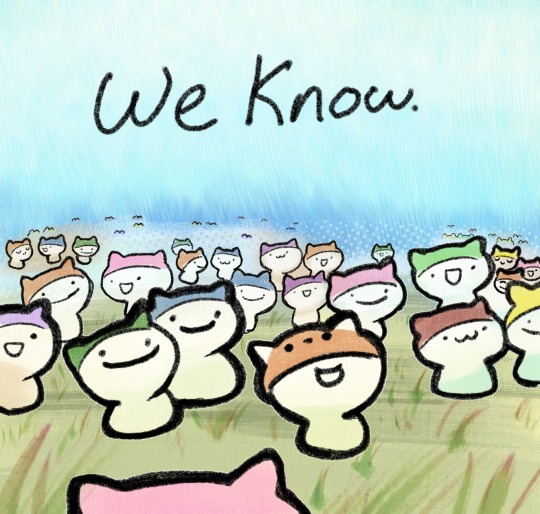
#artists on tumblr#do not repost/steal#no ai/ no nft#dreamfanart#dreamwastaken#fanart#dream fanart#dreamblr#dream team creatives#It would be funny if this wasn’t the announcement#But also funny if it was#Smiletwt gets so excitable#We never let him announce anything lol#Marketing strat I guess#Dreanies#Cat beanies#I fumbled the blobs HARD LOL#they look so messy#Not cute#unlike dream he is very pretty#THE LIL TUFT OF HAIR#The drurls are coming back
455 notes
·
View notes
Text
Reimu and the vanquishing of the Market

art by: "amibazh" who's been making these silly and unique classic art style Touhou paintings since 2018
#touhou project#unconnected marketeers#sannyo komakusa#misumaru tamatsukuri#takane yamashiro#mike goutokuji#reimu hakurei#I think they stopped posting these on Twitter around the AI art time. I bet they got falsely accused since ai trying style stuff trended
358 notes
·
View notes
Text

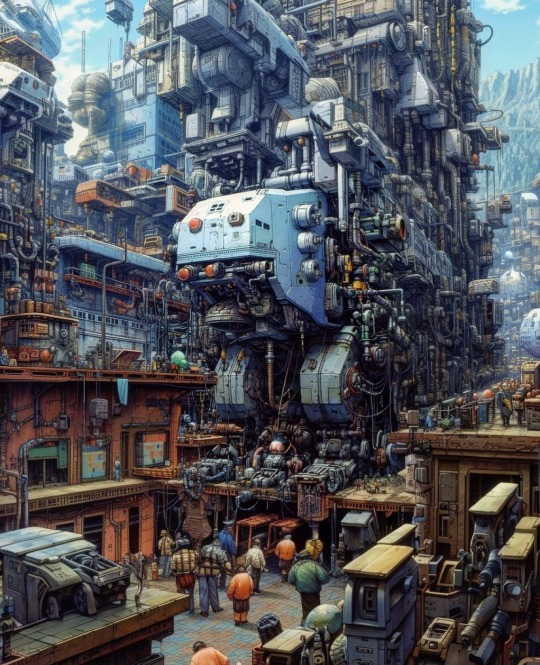
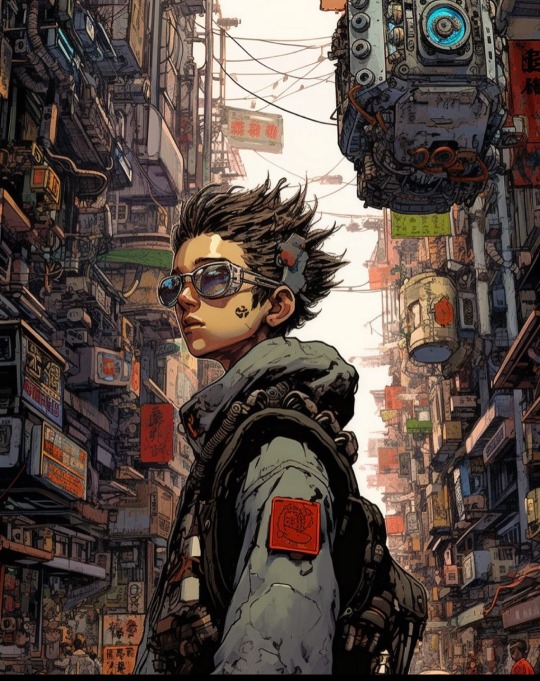

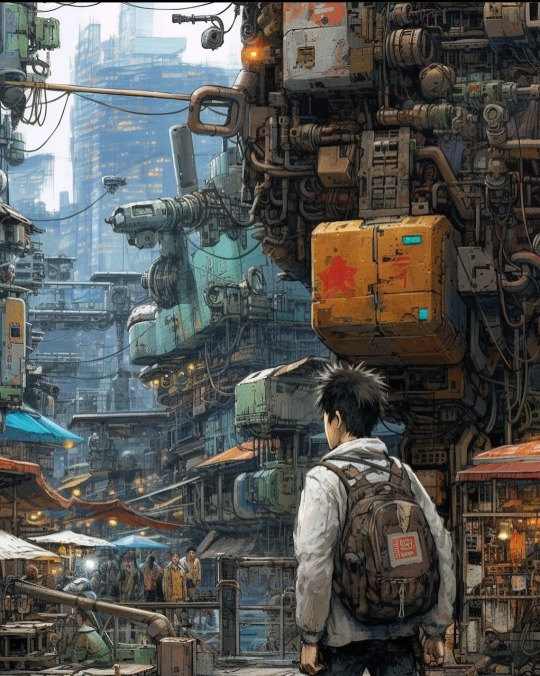

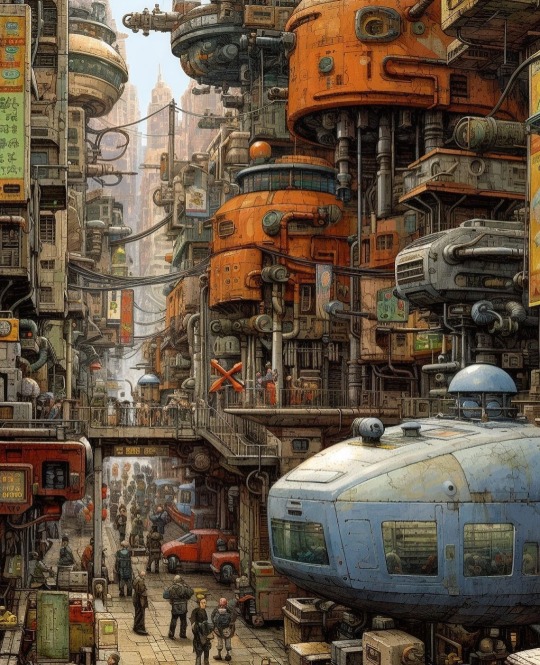

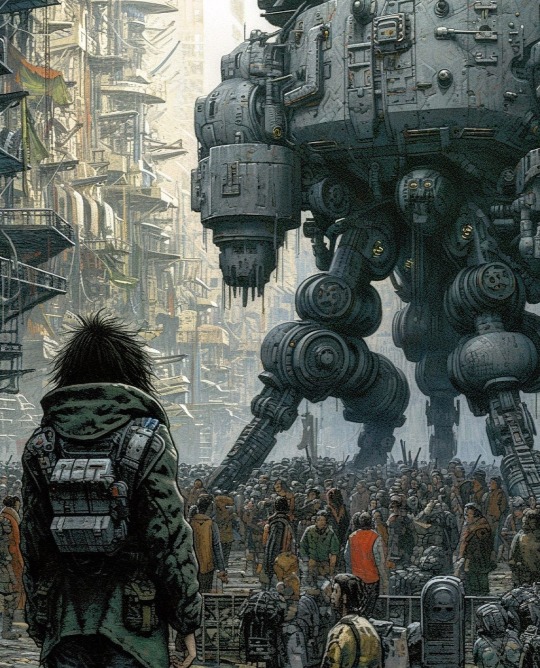

By swordspeed
#nestedneons#cyberpunk#cyberpunk art#cyberpunk aesthetic#cyberpunk artist#art#megacity#cyberwave#futuristic city#cryptoart#abdroid#biomech#biomechanoid#biomechanical#bionic eye market#midjourney#ai art#ai artwork#ai artist#aiartcommunity#thisisaiart#scifi#futuristic#futurism#cyber futurism#retrocyberwave#retro scifi#retrowave
1K notes
·
View notes
Text
🎅 Marché de Noël 🎄
Source: Zulfiia Ermakova
👋 Bel après-midi
#short video#zulfiia ermakova#marché de noël#christmas season#christmas spirit#ai#artificial intelligence#décoration#cadeaux#vitrine de noël#christmas market#sapin de noël#bel après-midi#fidjie fidjie
80 notes
·
View notes
Text
i know this isnt what i usually post, "shut up fat kink blog" i dont fucking care sit the hell down and listen.
You're aware of the Huion New Year AIGI Tweet, right?
LEST WE FORGET, back in november last year:
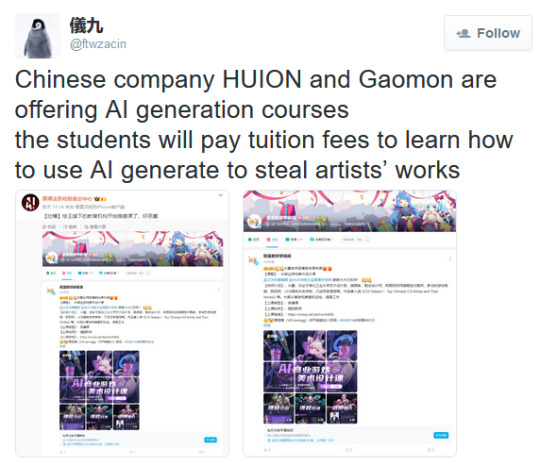
If you want to buy a Wacom, Huion or Gaumon device, I'd recommend either looking into an alternative or buying secondhand/refurbished from 3rd party sellers on Ebay or something. Avoid Amazon for all the obvious reasons.
This is fucking disgusting. This is embarrassing. This is unacceptable.
most importantly,
They won't stop.
#lobby your local law places or whatever im not a lawyer#your representatives#controlling the use of AI and AIGIs for use in marketing needs to end and it will only end once its fucking illegal.#if anyone has any additions PLEASE add on to this post#if I'm wrong also please let me know because im dont wanna b responsible for spreading misinfo#god im pissed off.#wacom drama starts like a month after i drop a chunk of my life savings on a cintiq#im so over capitalism#im so over social media#hate it hate it hate it bite bite scratch chew kill#soft5ku11 speaking
352 notes
·
View notes
Text
I've been told my comic feels like it was written by AI.
I suppose I'm not trying to be groundbreaking. I'm not interested in pioneering genres. I'm not writing for the purpose of literary analysis.
But written by AI...?
I'm already someone who has my humanity questioned. My identity erased. My existence disrespected. It could be worse. Anything could be worse.
But AI?
I spend weeks writing single scenes, toiling over the implications of single lines. I have goals. My writing has intent.
If you cared to read deeper, perhaps you'd see the themes. Maybe then you'd see the value. If you tried to analyze it maybe you'd see something there.
Maybe you'd see me.
Someone told me my comic seemed like it was written by AI.
And my humanity was denied one step further in that my voice was not seen in the work I've poured years of my life into.
#this is a comment that has bothered me for... a long time.#it really sat with me.#its insulting of course...#but i get insults all the time#thats not what bothered me.#there was something more to it#something more to how this hurt my feelings and why it lingered so long in my mind#and i think its because of this.#it removes me. it removes my humanity.#in a world where i already feel so invisible and invalidated#where i express myself. my love. through my work#to be told it seems like something a literal robot coild make#a conglomeration of marketable ideas#god. jts so insulting on a completely other level.#its straight up dehumanizing#so. watch the things you say seem like ai#when its actually made by an artist#especially if you know that it was made bh someone#they have a heart an theyre trying to show it to you#i know its not that deep or whatever.#but isnt it?#isnt the point of our art to connect to others? to love them? to spend time with them??#im being dramatic#but i also care#and sometimes a little extra drama is what gets my ideas across.#i would know#im a writer
185 notes
·
View notes
Text
Sympathy for the spammer

Catch me in Miami! I'll be at Books and Books in Coral Gables on Jan 22 at 8PM.

In any scam, any con, any hustle, the big winners are the people who supply the scammers – not the scammers themselves. The kids selling dope on the corner are making less than minimum wage, while the respectable crime-bosses who own the labs clean up. Desperate "retail investors" who buy shitcoins from Superbowl ads get skinned, while the MBA bros who issue the coins make millions (in real dollars, not crypto).
It's ever been thus. The California gold rush was a con, and nearly everyone who went west went broke. Famously, the only reliable way to cash out on the gold rush was to sell "picks and shovels" to the credulous, doomed and desperate. That's how Leland Stanford made his fortune, which he funneled into eugenics programs (and founding a university):
https://www.hachettebookgroup.com/titles/malcolm-harris/palo-alto/9780316592031/
That means that the people who try to con you are almost always getting conned themselves. Think of Multi-Level Marketing (MLM) scams. My forthcoming novel The Bezzle opens with a baroque and improbable fast-food Ponzi in the town of Avalon on the island of Catalina, founded by the chicle monopolist William Wrigley Jr:
http://thebezzle.org
Wrigley found fast food declasse and banned it from the island, a rule that persists to this day. In The Bezzle, the forensic detective Martin Hench uncovers The Fry Guys, an MLM that flash-freezes contraband burgers and fries smuggled on-island from the mainland and sells them to islanders though an "affiliate marketing" scheme that is really about recruiting other affiliate markets to sell under you. As with every MLM, the value of the burgers and fries sold is dwarfed by the gigantic edifice of finance fraud built around it, with "points" being bought and sold for real cash, which is snaffled up and sucked out of the island by a greedy mainlander who is behind the scheme.
A "bezzle" is John Kenneth Galbraith's term for "the magic interval when a confidence trickster knows he has the money he has appropriated but the victim does not yet understand that he has lost it." In every scam, there's a period where everyone feels richer – but only the scammers are actually cleaning up. The wealth of the marks is illusory, but the longer the scammer can preserve the illusion, the more real money the marks will pump into the system.
MLMs are particularly ugly, because they target people who are shut out of economic opportunity – women, people of color, working people. These people necessarily rely on social ties for survival, looking after each others' kids, loaning each other money they can't afford, sharing what little they have when others have nothing.
It's this social cohesion that MLMs weaponize. Crypto "entrepreneurs" are encouraged to suck in their friends and family by telling them that they're "building Black wealth." Working women are exhorted to suck in their bffs by appealing to their sisterhood and the chance for "women to lift each other up."
The "sales people" trying to get you to buy crypto or leggings or supplements are engaged in predatory conduct that will make you financially and socially worse off, wrecking their communities' finances and shattering the mutual aid survival networks they rely on. But they're not getting rich on this – they're also being scammed:
https://papers.ssrn.com/sol3/papers.cfm?abstract_id=4686468
This really hit home for me in the mid-2000s, when I was still editing Boing Boing. We had a submission form where our readers could submit links for us to look at for inclusion on the blog, and it was overwhelmed by spam. We'd add all kinds of antispam to it, and still, we'd get floods of hundreds or even thousands of spam submissions to it.
One night, I was lying in my bed in London and watching these spams roll in. They were all for small businesses in the rustbelt, handyman services, lawn-care, odd jobs, that kind of thing. They were 10 million miles from the kind of thing we'd ever post about on Boing Boing. They were coming in so thickly that I literally couldn't finish downloading my email – the POP session was dropping before I could get all the mail in the spool. I had to ssh into my mail server and delete them by hand. It was maddening.
Frustrated and furious, I started calling the phone numbers associated with these small businesses, demanding an explanation. I assumed that they'd hired some kind of sleazy marketing service and I wanted to know who it was so I could give them a piece of my mind.
But what I discovered when I got through was much weirder. These people had all been laid off from factories that were shuttering due to globalization. As part of their termination packages, their bosses had offered them "retraining" via "courses" in founding their own businesses.
The "courses" were the precursors to the current era's rise-and-grind hustle-culture scams (again, the only people getting rich from that stuff are the people selling the courses – the "students" finish the course poorer). They promised these laid-off workers, who'd given their lives to their former employers before being discarded, that they just needed to pull themselves up by their own boostraps:
https://pluralistic.net/2023/04/10/declaration-of-interdependence/#solidarity-forever
After all, we had the internet now! There were so many new opportunities to be your own boss! The course came with a dreadful build-your-own-website service, complete with an overpriced domain sales portal, and a single form for submitting your new business to "thousands of search engines."
This was nearly 20 years ago, but even then, there was really only one search engine that mattered: Google. The "thousands of search engines" the scammers promised to submit these desperate peoples' websites to were just submission forms for directories, indexes, blogs, and mailing lists. The number of directories, indexes, blogs and mailing lists that would publish their submissions was either "zero" or "nearly zero." There was certainly no possibility that anyone at Boing Boing would ever press the wrong key and accidentally write a 500-word blog post about a leaf-raking service in a collapsing deindustrialized exurb in Kentucky or Ohio.
The people who were drowning me in spam weren't the scammers – they were the scammees.
But that's only half the story. Years later, I discovered how our submission form was getting included in this get-rich-quick's mass-submission system. It was a MLM! Coders in the former Soviet Union were getting work via darknet websites that promised them relative pittances for every submission form they reverse-engineered and submitted. The smart coders didn't crack the forms directly – they recruited other, less business-savvy coders to do that for them, and then often as not, ripped them off.
The scam economy runs on this kind of indirection, where scammees are turned into scammers, who flood useful and productive and nice spaces with useless dross that doesn't even make them any money. Take the submission queue at Clarkesworld, the great online science fiction magazine, which famously had to close after it was flooded with thousands of junk submission "written" by LLMs:
https://www.npr.org/2023/02/24/1159286436/ai-chatbot-chatgpt-magazine-clarkesworld-artificial-intelligence
There was a zero percent chance that Neil Clarke would accidentally accept one of these submissions. They were uniformly terrible. The people submitting these "stories" weren't frustrated sf writers who'd discovered a "life hack" that let them turn out more brilliant prose at scale.
They were scammers who'd been scammed into thinking that AIs were the key to a life of passive income, a 4-Hour Work-Week powered by an AI-based self-licking ice-cream cone:
https://pod.link/1651876897/episode/995c8a778ede17d2d7cff393e5203157
This is absolutely classic passive-income brainworms thinking. "I have a bot that can turn out plausible sentences. I will locate places where sentences can be exchanged for money, aim my bot at it, sit back, and count my winnings." It's MBA logic on meth: find a thing people pay for, then, without bothering to understand why they pay for that thing, find a way to generate something like it at scale and bombard them with it.
Con artists start by conning themselves, with the idea that "you can't con an honest man." But the factor that predicts whether someone is connable isn't their honesty – it's their desperation. The kid selling drugs on the corner, the mom desperately DMing her high-school friends to sell them leggings, the cousin who insists that you get in on their shitcoin – they're all doing it because the system is rigged against them, and getting worse every day.
These people reason – correctly – that all the people getting really rich are scamming. If Amazon can make $38b/year selling "ads" that push worse products that cost more to the top of their search results, why should the mere fact that an "opportunity" is obviously predatory and fraudulent disqualify it?
https://pluralistic.net/2023/11/29/aethelred-the-unready/#not-one-penny-for-tribute
The quest for passive income is really the quest for a "greater fool," the economist's term for the person who relieves you of the useless crap you just overpaid for. It rots the mind, atomizes communities, shatters solidarity and breeds cynicism:
https://pluralistic.net/2023/02/24/passive-income/#swiss-cheese-security
The rise and rise of botshit cannot be separated from this phenomenon. The botshit in our search-results, our social media feeds, and our in-boxes isn't making money for the enshittifiers who send it – rather, they are being hustled by someone who's selling them the "picks and shovels" for the AI gold rush:
https://www.theguardian.com/commentisfree/2024/jan/03/botshit-generative-ai-imminent-threat-democracy
That's the true cost of all the automation-driven unemployment criti-hype: while we're nowhere near a place where bots can steal your job, we're certainly at the point where your boss can be suckered into firing you and replacing you with a bot that fails at doing your job:
https://pluralistic.net/2024/01/11/robots-stole-my-jerb/#computer-says-no
The manic "entrepreneurs" who've been stampeded into panic by the (correct) perception that the economy is a game of musical chairs where the number of chairs is decreasing at breakneck speed are easy marks for the Leland Stanfords of AI, who are creating generational wealth for themselves by promising that their bots will automate away all the tedious work that goes into creating value. Expect a lot more Amazon Marketplace products called "I'm sorry, I cannot fulfil this request as it goes against OpenAI use policy":
https://www.theverge.com/2024/1/12/24036156/openai-policy-amazon-ai-listings
No one's going to buy these products, but the AI picks-and-shovels people will still reap a fortune from the attempt. And because history repeats itself, these newly minted billionaires are continuing Leland Stanford's love affair with eugenics:
https://www.truthdig.com/dig-series/eugenics/
The fact that AI spam doesn't pay is important to the fortunes of AI companies. Most high-value AI applications are very risk-intolerant (self-driving cars, radiology analysis, etc). An AI tool might help a human perform these tasks more accurately – by warning them of things that they've missed – but that's not how AI will turn a profit. There's no market for AI that makes your workers cost more but makes them better at their jobs:
https://locusmag.com/2023/12/commentary-cory-doctorow-what-kind-of-bubble-is-ai/
Plenty of people think that spam might be the elusive high-value, low-risk AI application. But that's just not true. The point of AI spam is to get clicks from people who are looking for better content. It's SEO. No one reads 2000 words of algorithm-pleasing LLM garbage over an omelette recipe and then subscribes to that site's feed.
And the omelette recipe generates pennies for the spammer that posted it. They are doing massive volume in order to make those pennies into dollars. You don't make money by posting one spam. If every spammer had to pay the actual recovery costs (energy, chillers, capital amortization, wages) for their query, every AI spam would lose (lots of) money.
Hustle culture and passive income are about turning other peoples' dollars into your dimes. It is a negative-sum activity, a net drain on society. Behind every seemingly successful "passive income" is a con artist who's getting rich by promising – but not delivering – that elusive passive income, and then blaming the victims for not hustling hard enough:
https://www.ftc.gov/business-guidance/blog/2023/12/blueprint-trouble
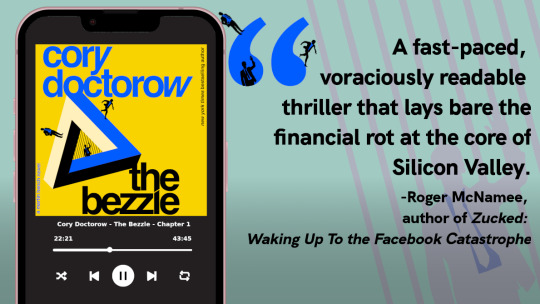
I'm Kickstarting the audiobook for The Bezzle, the sequel to Red Team Blues, narrated by @wilwheaton! You can pre-order the audiobook and ebook, DRM free, as well as the hardcover, signed or unsigned. There's also bundles with Red Team Blues in ebook, audio or paperback.

If you'd like an essay-formatted version of this post to read or share, here's a link to it on pluralistic.net, my surveillance-free, ad-free, tracker-free blog:
https://pluralistic.net/2024/01/15/passive-income-brainworms/#four-hour-work-week

Image: Cryteria (modified) https://commons.wikimedia.org/wiki/File:HAL9000.svg
CC BY 3.0 https://creativecommons.org/licenses/by/3.0/deed.en
#pluralistic#late-stage capitalism#end-stage capitalism#feudalism#rentierism#blueprint for wealth#predation#clarkesworld#kindle#kindle unlimited program#kup#pyramid schemes#mlms#multilevel marketing#amway#spam#form spam#enshittification#ai#llms#large language models#chatbots#ucm#seo#search engine optimization#dark seo#passive income#passive income brainworms
825 notes
·
View notes
Text
Webtoons Is Making Moves - So Should You.


We all saw it coming ages ago and now it's finally here. There's no more beating around the bush or doubting if anyone is "reading into it too much", Webtoons' use of AI in its more recent webtoons is not an accident, not an oversight, but by design, it always has been. And I guaran-fucking-tee you that the work that already exists on the platform won't be safe from Webtoons' upcoming AI integration through scraping and data mining. Sure, they can say they're not gonna replace human creators, but that doesn't change the fact that AI tools, in their current form, can't feasibly exist without stealing from pre-existing content.
Plus, as someone who's tested their AI coloring tools specifically... they're a long, LONG way away from actually being useful. Like, good luck using them for any comic style that isn't Korean manwha featuring predominantly white characters with small heads and comically long legs. And if they do manage to get their AI tools to incorporate more art styles and wider ranges of character identities... again, what do you think it's been trained on?
Also, as an added bit that I found very funny:

Um, I'm sorry, what fucking year is it? Because platforms like WT and Tapas have both been saying this for years but we're obviously seeing them backpedal on that now with the implementation of in-house publishing programs like Unscrolled which have reinvented the wheel of taking digital webtoons and going gasp physical! It's almost like the platform has learned that there's no sustainable profit to be had in digital comics alone without the help of supplementary streams of income and is now trying to act like they've invented physical book publishing!
"The future of comic publishing, including manga, will be digital"??? My brother in christ, Shonen Jump has been exclusively digital since 2012! What rock have the WT's staff been living under that they're trying to sell digital comics as the "future" to North Americans as if we haven't already been living in that future for over ten years now?? We've had an entire generation of children raised on that same digital media since then! This isn't the selling point you think it is LMAO If anything, the digital media market here in NA is dying thanks to the enshittification of digital content platorms like Netflix, Disney+, and mainstream social media platforms! That "future" is not only already both the past and present, but is swiftly on its way out! Pack it up and go home, you missed the bus!
Literally so much of WT's IPO pitch is just a deadass grift full of corporate buzzwords and empty promises. They're trying so hard to convince people that their business model is infinitely profitable... but if it were, why do they need the public's money? And where are all those profits for the creators who are being exploited day after day to fill their platform with content? Why are so many creators still struggling to pay their bills if the company has this much potential for profit?
Ultimately even their promised AI tools don't ensure profit, they ensure cutting expenses. The extra money they hope to make isn't gonna come from their content generating income, it's gonna come from normal people forking over their money in the hopes that it'll be turned around, and from Webtoons cheapening the medium even further until it's nothing but conveyer belt gruel. Sure, "making more than you spend" is the base definition of "profit", but can we really call it that when it's through the means of gutting features, retiring support programs, letting go editing staff, and limiting resources for their own hired freelancers who are the only reason they even have content to begin with? That's not sustainable profit or growth, that's fighting the tide which can and will carry them away at any moment.
I'm low key calling it now, a year or two from today we're gonna be seeing massive lawsuits and calls to action from the people who invested their money into WT and subsequently lost it into the black hole that is WT's "business model". This is a company that's been operating in the red for years, what about becoming an IPO is gonna make them "profitable"? Let alone profitable enough to pay back their investors in the spades they're expecting? The platform and its app are already shit and they're about to become even worse, we are literally watching this company circle the drain in the modern day's ever-ongoing race to the bottom, enshittification in motion, but they're trying to convince us all the same that they're "innovating".
Webtoons doesn't want to invest in its creators. We as creators need to stop investing in them.
#fuck webtoons#who wants to bet that WT will either start gatekeeping its creator features behind paywalls#or start selling your creator data - including your image assets that you submit to the site - to make their AI integrations “profitable”#call me crazy but this is 2024#webtoon critical#this also low key proves my theories that WT was simply outsourcing NA creators for pennies#all so they could build their market and then flood it with their own home turf content#and shove out the NA creators whose backs and labor and blood they built that market on
129 notes
·
View notes
Note
Regarding the DarkJurassic feature the thing that was up today, someone said the images were AI... I know its supposed to be a conspiracy website full of cuckoo's but please say they got an actual human artist or artists to create it? 🙏🙏😭😭
I'm pretty sure our human design team made all of those-- they were hanging up around the office for years lol. The intent was definitely to make them look like the sort of quick photoshop clickbait thumbnails and advertisements you see on real shady websites on purpose. And the reason there is no legible text is because we had no budget to write copy (you have to pay someone to write all the writing that appears on screen and that's why it usually shows up as gibberish in JWCC and JWCT unless it's REALLY important). I think those images were intended to be possible webpage designs that could have appeared in the actual show in like... the background of a shot or something.
#jurassic world chaos theory#jwct#jurassic world#chaos theory#chaos crew#I think when these were made AI was super dogshit too LOL#I can't imagine the any of the designers being on board to use AI#I also know a lot of people thought those dino travel posters DW marketing posted a while back were AI#but I think those were also just really quick and dirty photoshop jobs#I recognized some of the dinosaur poses and they were literally just renders that had the oil paint photoshop filter slapped on#I get being sus about AI but a lot of things are just quick photoshop jobs#ask#anonymous
92 notes
·
View notes
